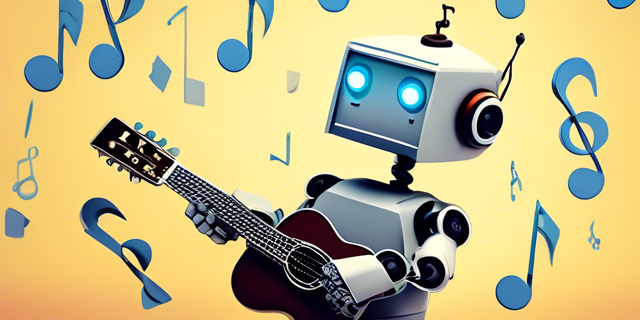Artificial Intelligence (AI) has revolutionized various sectors, and the music industry is no exception. With the emergence of tools like MakeBestMusic, creating music has become more accessible and fascinating. This article will delve into the capabilities of MakeBestMusic, offering a step-by-step guide on how to use it effectively, and discussing its potential and limitations.
Introduction to MakeBestMusic
MakeBestMusic is an AI-driven music generation tool that allows users to create music in various styles and languages. It supports genres such as pop, jazz, rock, and languages including Chinese, English, and Japanese. The latest version, V3, was released on March 22, enhancing the quality of AI-generated music significantly.
Getting Started with MakeBestMusic
To begin using MakeBestMusic, you need to log in through the official website. It's crucial to use the correct site, especially if you're accessing it from mainland China, as there might be unofficial versions available. Once logged in, the interface is straightforward, with three main tabs: Popular, Create, and Library.
Popular Tab
This tab features the most popular and recent songs generated by MakeBestMusic, giving users an idea of what the tool is capable of.
Create Tab
The Create tab is where the magic happens. Here, you can generate new songs using either the prompt method or the custom mode.
Library Tab
The Library tab stores your generated tracks, providing easy access to your music history.
Using MakeBestMusic: A Step-by-Step Guide
Prompt Method
The prompt method is the simpler of the two. It requires you to input a brief description of the song you want to create. Here are the settings you need to be aware of:
- Song Description: This is where you describe the theme or mood of the song.
- Instrument: By default, this is turned off. If enabled, it generates instrumental music without lyrics.
- Version: Always select the latest version for the best results (currently V3).
For example, if you want to create a song about not wanting to go to work, you can simply write, "A song that expresses not wanting to go to work." MakeBestMusic will typically generate two versions with the same lyrics but different melodies. You can choose which one you prefer.
Custom Mode
In custom mode, you have more control over the specific elements of the song. Here are the main settings:
- Lyrics: You can use existing lyrics, write your own, or even ask ChatGPT to generate them for you.
- Music Style: Specify the genre and style of music you want.
- Song Name: Give your creation a title.
- Model: Select the appropriate model for generating the song.
For those unsure about music styles, MakeBestMusic provides a document with various genres, instruments, and emotional tones that you can refer to.
Tips for Creating Better Music with MakeBestMusic
To get the best results, your prompts should be detailed. Here are some elements to include in your prompts:
- Sound Prompts: Specify the type of voice (e.g., male, female).
- Language Prompts: Choose the language for the lyrics.
- Music Styles: Mention the genre (e.g., KPOP, JPOP, electronic).
- Emotional Atmosphere: Describe the mood (e.g., cheerful, melancholy).
- Rhythm and Speed: Indicate the tempo.
- Specific Instruments: Mention any specific instruments you want to include.
For example, a detailed prompt could be: "Create a pop song with a relaxing guitar melody about not wanting to go to work, sung by a male voice in Mandarin."
Enhancing Your Music: Additional Tools and Techniques
While MakeBestMusic is powerful, it has some limitations that can be mitigated with additional tools:
- UVR5 and ACE: These tools can help you split tracks and modify lyrics, allowing for more refined edits.
- Meta Tags: Use meta tags to give more specific instructions about the song's structure, instruments, and singing style.
Limitations and Potential of MakeBestMusic
As impressive as MakeBestMusic is, it still has some drawbacks:
- Quality of Chinese Songs: Some Chinese songs may sound simplistic and lack the sophisticated melody of professional compositions.
- Lyrics Quality: Automatically generated lyrics, especially in Chinese, may not always rhyme or make logical sense.
- Sound Quality: There may be issues with sound clarity and pronunciation.
Despite these limitations, MakeBestMusic has shown remarkable progress in just a year. As the AI continues to learn from more datasets, it's expected to produce higher-quality music that meets diverse user needs.
Monetizing AI-Generated Music
Many users wonder how they can profit from music created with AI. MakeBestMusic offers different payment models:
- Free Version: Generate up to 10 songs per day, but these cannot be used commercially.
- Pro and Premier Versions: Support a larger number of songs and allow for commercial use.
To make money from AI-generated music, you can publish your tracks on various music platforms, create music videos, or even use them in commercial projects. For detailed strategies, consider enrolling in courses that focus on AI music business practices.
Conclusion
MakeBestMusic represents a significant advancement in the realm of AI-generated music. It offers both simplicity and depth, making it accessible for novices and valuable for experienced musicians. While there are areas for improvement, its potential is undeniable. As AI continues to evolve, tools like MakeBestMusic will likely become indispensable in the music industry.
"The more AI is involved, the careers of some musicians may be affected by AI, and the music industry will experience a survival of the fittest."
If you're interested in exploring the world of AI music, MakeBestMusic is an excellent place to start. Don't forget to like, follow, and share your experiences in the comments below. Let's embrace the future of music together!
